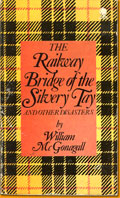
Exhibit A
Criticism of the work of William Topaz McGonagall (the poet who lived in Dundee) commonly falls into the category of "received wisdom" or worse and more usually, cliche. Hooray Henrys are always quick with the label "worst poet ever" and betray either their own snobbishness or ignorance of what great poetry might possibly be. McGonagall is routinely patronised by suggestions that he is now beloved (to a greater extent than all but the most famous poets?) because of his heroic failures or his near delusional persistence.
But what really makes great poetry? By what incontestable set of rules is poetry to be measured? And why does McGonagall's poetry survive?
It's true that even the meanest intelligence can respond to poetry and even commit to memory a fragment or verse heard in the distant past, but the mechanism that enables this to happen - rhythm, rhyme, story, metaphor, vocabulary - is little understood. Which is the most important of these qualities, the one that must be present to a necessary extent before a work can be considered "good" poetry?
I'm not certain that any of McGonagall's gallery of critics can say. They only think they know why he "fails".
